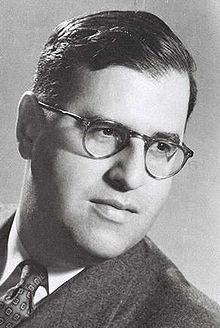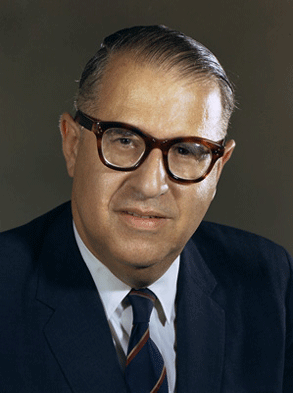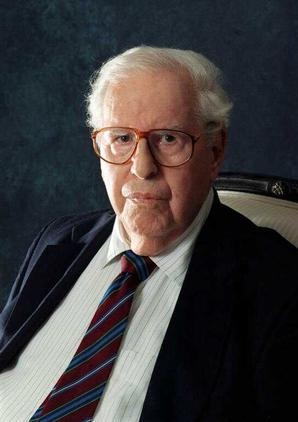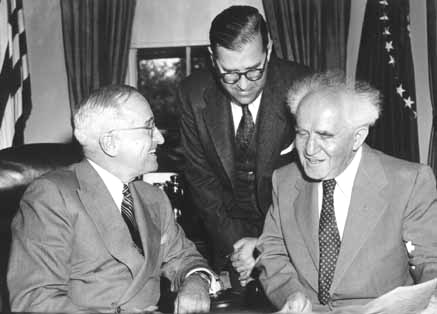<Back to Index>
- Foreign Minister Abba Eban (Abba Solomon Meir), 1915
PAGE SPONSOR



Abba Eban (Hebrew: אבא אבן, born Abba Solomon Meir; later adopted Aubrey Solomon Eban; 2 February 1915 – 17 November 2002) was an Israeli diplomat and politician.
In his career he was Israeli Foreign Affairs Minister, Education Minister, Deputy Prime Minister, and Ambassador to the United States and to the United Nations. He was also Vice President of the United Nations General Assembly and President of the Weizmann Institute of Science.
Born in Cape Town, South Africa, on 2 February 1915, Eban moved to the United Kingdom at an early age. As a child, he recalled being sent to his grandfather's house every weekend to study the Hebrew language and Biblical literature. He lived for a period of time in Belfast.
He was educated at St Olave's Grammar School, then in Southwark, before studying Classics and Oriental languages at Queens' College, Cambridge, where he achieved a triple first. During his time at University and afterwards, Eban was highly involved in the Federation of Zionist Youth and was editor of its ideological journal, The Young Zionist.
After graduating with high honors, he researched Arabic and Hebrew as a Fellow of Pembroke College from 1938 – 39. At the outbreak of World War II, he went to work for Chaim Weizmann at the World Zionist Organization in London from December 1939. He served in the British Army in Egypt and Mandate Palestine, becoming an intelligence officer in Jerusalem, where he coordinated and trained volunteers for resistance in the event of a German invasion, serving as a liaison officer for the Allies to the Jewish Yishuv. In 1947, he translated from the original Arabic, Maze of Justice: Diary of a Country Prosecutor, a 1937 novel by Tawfiq al-Hakim.
Eban moved back to London briefly to work in the Jewish Agency's Information Department, from which he was posted to New York, where the United Nations General Assembly was considering the "Palestine Question". In 1947, he was appointed as a liaison officer to the United Nations Special Committee on Palestine, where he was successful in attaining approval for the partition of Palestine into Jewish and Arab segments — Resolution 181.
At this stage, he changed his name to the Hebrew word Abba (however it was seldom used informally), meaning "Father", as he could foresee himself as the father of the nation of Israel. Eban spent a decade at the United Nations, and also served as his country's ambassador to the United States at the same time. He was renowned for his oratorical skills. In the words of Henry Kissinger:
I have never encountered anyone who matched his command of the English language. Sentences poured forth in mellifluous constructions complicated enough to test the listener’s intelligence and simultaneously leave him transfixed by the speaker's virtuosity.
His grasp of history and fluency in ten languages enhanced his speech making in the United Nations, even to skeptical or hostile audiences. In 1952, Eban was elected Vice President of the UN General Assembly.
Eban left the United States in 1959 and returned to Israel, where he was elected to the Knesset (the Israeli parliament) as a member of Mapai. He served under David Ben - Gurion as Minister of Education and Culture from 1960 to 1963, then as deputy to Prime Minister Levi Eshkol until 1966. Through this period (1959 – 66), he also served as president of the Weizmann Institute in Rehovot.
From 1966 to 1974, Eban served as Israel's foreign minister, defending the country's reputation after the Six Day War and claiming Israel was attacked first "So on the fateful morning of 5 June, when Egyptian forces moved by air and land against Israel's western coast". Nonetheless, he was a strong supporter of trading parts of the territories occupied in the war in exchange for peace. He played an important part in the shaping of UN Security Council Resolution 242 in 1967, as well as Resolution 338 in 1973. Among his other high level contacts, Eban was received by Pope Paul VI in 1969.
Eban was at times criticized for not voicing his opinions in Israel's internal debate. However, he was generally known to be on the "dovish" side of Israeli politics and was increasingly outspoken after leaving the cabinet. In 1977 and 1981, it was widely understood that Shimon Peres intended to name Eban Foreign Minister, had the Labor Party won those elections. Eban was offered the chance to serve as minister without portfolio in the 1984 national unity government, but chose to serve instead as Chair of the Knesset's Foreign Affairs and Defense Committee from 1984 to 1988.
His comment that Palestinians "never miss an opportunity to miss an opportunity" (i.e., for peace), made after the Geneva peace talks in December 1973, is often quoted.
In 1988, after three decades in the Knesset, he lost his seat over internal splits in the Labor Party. He devoted the rest of his life to writing and teaching, including serving as a visiting academic at Princeton University, Columbia University and George Washington University. He also narrated television documentaries including Heritage: Civilization and the Jews (PBS, 1984), for which he was host, Israel, A Nation Is Born (1992), and On the Brink of Peace (PBS, 1997).
Eban died in 2002 and was buried in Kfar Shmaryahu, north of Tel Aviv. He was survived by his wife and their two children.
Eban's brother - in - law was the late Chaim Herzog, the sixth president of Israel. Herzog's son Isaac Herzog was a member in Israel's Knesset.
Eban's cousin, Oliver Sacks, was a neurologist and author and his son, Eli Eban, a renowned clarinetist who taught at Indiana University. Eli has two children, Yael and Omri Eban. His nephew, Jonathan Lynn, was a filmmaker and script writer known for satirical BBC shows Yes Minister and Yes, Prime Minister. Lynn recounted that the plot of an episode of Yes, Prime Minister ("A Victory for Democracy"), which involved the British Prime Minister bypassing his own Arab - centric bureaucracy by taking the Israeli ambassador's advice, was based on an actual incident narrated to him by Eban.
In 2001, Eban was awarded the Israel Prize for lifetime achievement and special contribution to society and the State.
In 2005, he was voted the 52nd greatest Israeli of all time, in a poll by the Israeli news website Ynet to determine whom the general public considered the 200 Greatest Israelis.
